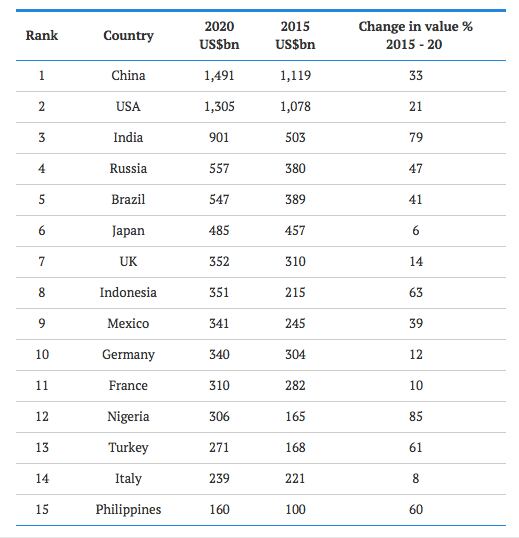The forecast, by the UK-based Institute of Grocery Distribution, suggests that China will comfortably retain its position as the world’s biggest grocery market even though other countries will grow faster, with Nigeria’s rise being the fastest.

Indonesia’s grocery market will be worth almost as much as the UK’s by 2020 to take eighth position in the world, at US$351bn.
“The vast majority of global grocery growth will come from Asia, Africa and the Middle East supported by increasing affluence, urbanisation, and rising population,” said Joanne Denney-Finch, IGD’s chief executive.
“With many European products and brands highly regarded in these regions, this will be a boom time for companies with export skills.”
China will maintain its position as the world’s biggest grocery market for the foreseeable future in spite of its slowing growth rate, said Denney-Finch, adding that the lion’s share of the country’s grocery growth would take place in tiers three and four cities—regional medium-income cities undergoing rapid development.
This means many more opportunities for retailers and Western brands, she added.
“For example, online grocery will enjoy explosive growth in China, though from a modest base, tripling in size between now and 2020. This will be powered by more Chinese having access to the internet through smartphones and other devices.”
Meanwhile, in India, which is expected to see growth of 79% by 2020, traditional stores will continue to take the biggest share of the country’s grocery market, though per capita consumer spending will grow faster in the subcontinent than in any of the top grocery markets.
Combined with an expanding working-age population this will support the growth of modern convenience and supermarket retailing.
“Retailers are also rapidly setting up online grocery services hoping to tap into the potential of India’s half a billion smartphone users. Despite restrictions on foreign direct investment, international retailers continue to see the potential of investing in India,” said Denney-Finch.
Lack of activity largely behind Beijing's rise in student obesity
Student obesity in Beijing’s primary and middle schools was recorded at 15.6% in 2014, an increase of 2.6% over the previous year, according to data released by the Chinese capital’s public health watchdog.

Among those registered as obese, nearly two-thirds suffered from increased blood glucose, one-third had raised blood pressure, and 16% were diagnosed with fatty liver, the survey showed.
The research, which associated poor diet and a lack of exercise by the city’s schoolchildren for this growth in obesity, was backed up another survey, which tracked the health of 36,962 college and high school students in the city, finding that around 40% did not get enough exercise, 42.1% spent more than two hours in front of the computer, and 37.4% regularly skipped breakfast, Xinhua reported.
Yum Brands management reshuffle after Su retirement
The retirement of Sam Su, the chairman and chief executive of Yum Brands in China who was instrumental in its expansion in the country, has prompted the owner of KFC and Pizza Hut to appoint company veteran Micky Pant in his place.

Currently chief executive of Yum’s KFC unit, Pant will be replaced by Joey Watt, who is currently president of the brand.
Su will serve as an executive adviser until February and remain on Yum's board to assist with the transition. The management change comes at a time when the fast-food chain has been seeing sluggish sales and reeling from a tainted meat scandal.
Greg Creed, global chief executive of Yum Brands, eulogised: "Su is a restaurant industry pioneer who established KFC and Pizza Hut as global powerhouses in the world's fastest-growing economy.”
Less land but better yield evens out rice harvest figures
In spite of a shrinkage of land given over to rice, China has been seeing an increase in yield to register only a small shortfall in production compared to 2014’s first harvest.
According to the National Bureau of Statistics, China produced 33.7m tonnes of early rice, a reduction of 0.9% from last year.
The country’s planting area was 1.4% smaller than 2014, with yield growth per hectare rising 0.4% to 5.89 tonnes.
This increase in yield was due to favourable weather and support by local authorities to farmers by providing seeds and pest control, Xinhua reported.
Early rice is one of three grain crops, with autumn crop, which include corn and middle- and late-season rice, account for the bulk of the grain production, the official news agency said.
Hong Kong authorities monitoring Tianjin produce following blasts
Following the explosions in Tianjin, Hong Kong’s Centre for Food Safety (CFS) has been maintaining close contact with mainland authorities to follow up on the safety of food supplied to Hong Kong from the region surrounding the blasts.
"To allay public concerns and for the sake of prudence, the CFS will take samples of food products from areas around Tianjin, as well as the same kind of food products which had been supplied to Hong Kong from that city before, including vegetables, fruits and edible aquatic animals, for tests,” a CFS spokesperson said.
There are seven registered vegetable farms in Tianjin, one registered edible aquatic animal farm and one registered live cattle farm which are eligible to supply food products to Hong Kong.
